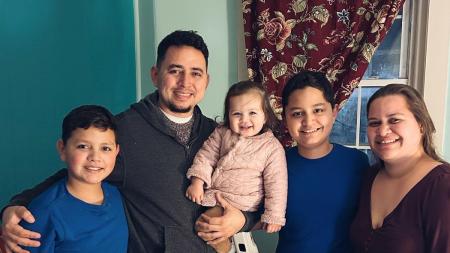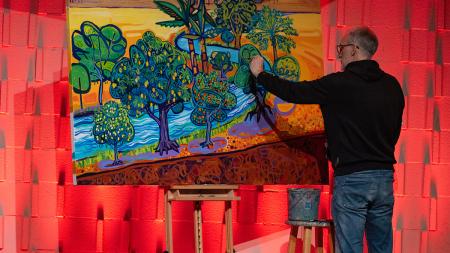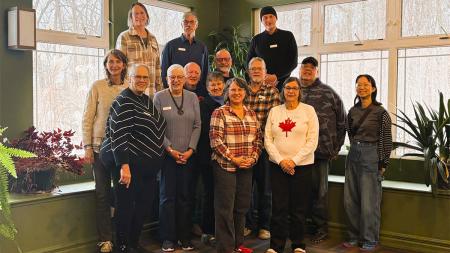One in Common Witness

Language matters. That was a key theme in the talk that Bishop Zac Niringiye, a retired bishop of the Anglican Church of Uganda, gave to Inspire 2022 attendees on Aug. 6.
After earning a degree in physics from Makerere University, Kampala, Uganda, Niringiye decided to focus on theology. He earned a master’s degree from Wheaton (Ill.) College and a Ph.D. from the University of Edinburgh, Scotland. He spent many years as a regional director for the Church Missionary Society, promoting missionary work across Africa. He is the author of The Church: God’s Pilgrim People and is an advocate for social justice in Uganda.
“When I was asked to speak at Inspire 2022, the theme I was given to speak on was ‘Inspired to be one . . . in common mission,’” he said. This coincides with the CRCNA’s fourth milestone of Our Journey 2025: Share the gospel, live it missionally, and plant new churches in our neighborhoods as we discover how to connect with our local and global ministry contexts.
“I pleaded with the Inspire organizers to change this theme to ‘Inspired to be one . . . in common witness’ instead,” he said.
Niringiye explained that the idea of “mission” is part of the problem faced in the church today. He reminded listeners that the term mission does not exist in Scripture, nor in African vernacular.
According to Niringiye, “mission” has too often been mixed with patterns of economic and cultural domination. It is also often associated with advancing a specific denomination or congregation. As a result, he said, our churches become nothing more than clubs with rules for membership and ways of identifying those who don’t belong.
Niringiye represented the “club” of the Anglican church of Uganda, he said, and he was at Inspire 2022 to speak to the “club” of the Christian Reformed Church in North America.
Niringiye challenged attendees to instead consider unity in “common witness” rather than mission. Witness, he explained, comes not from the “club” to which we belong but from being a person of Christ, loved by God, recognizing the lenses from which we see the world, and learning from other witnesses.
He encouraged CRC folks to approach the issue of truth with great humility, noting that the apostle Paul said in 1 Corinthians 13:12 that we can currently only see things as in a dim reflection. It is important, he said, for us to admit that we, like Paul, only see in part – and that it is a negligible part at best.
“What we claim to know, the meanings we attach to anything, the meaning we attach to our being, our location in the world, is filtered through our experience. How we make sense of what we see is made sense by and through the particularity of our lenses,” he said.
In order to be one in common witness, then, Niringiye argued, we must recognize our lenses and work to find common language with others. This can only result from time spent listening to and learning from one another in order to create common memory.
“Where community is to be formed, common memory must be created,” he explained. “I suggest to us that what Inspire can be about is to help us begin and continue on a journey of forming a common memory.”
Niringiye suggested that the Lord’s Prayer is a good place to start, since it is a prayer used by Christians all over the world. While the meaning ascribed to it will be different when it is prayed in urban Chicago than when it is prayed in rural Alberta or the villages of Uganda, he said, by praying it together we can learn from each other.
He then walked attendees through the Lord’s Prayer line by line, noting that it is a prayer spoken not individually but corporately, focused on God’s will, not our own.
For example, Niringiye noted that the request to “give us this day our daily bread” goes back to basic human needs for clothes, food, and shelter. Many of us who pray this prayer already know where the food is. It is in our fridges or at the supermarket.
“If you didn’t pray this prayer, it would not change your life. You know where the food is,” he said. For those with plenty to pray asking for food, then, may seem hypocritical. But, added Niringiye, we continue to pray this line because it reminds us of those for whom daily bread is not assumed.
“We pray this prayer because it opens our eyes to our brothers and sisters -- our human family-- who do not have food,” he said. “It is a commitment to open the fridge and share so that this dear brother, for whom daily bread is not a reality, can rejoice – and we can pray that prayer together with them.”
In a similar way, the rest of the Lord’s Prayer is a call to recognize our privilege and submit to God’s greater plan, he said.
“For Jesus of Nazareth, prayer was life,” said Niringiye. “What a challenge for our ‘clubs’ because we have made prayer a church activity for which we check the boxes. But prayer is a testimony about who we are in the world. If you want to know the witness of a community that calls itself a community of Christ, watch and listen to how they pray. That will tell you about their understanding of their location in the world.”
Authentic prayer, he added, is not about trying to control others. It is about joining the Holy Spirit already at work, and submitting to the will of the Father. It renounces the perspective of privilege and connects with what God is doing in the world. It also carefully examines our own limitations.
“We are a problem in the world,” Niringiye said. “Lord save us from Christianity, save us from denominationalism. Deliver us, we pray.”
And that “us” is not limited to the people who look like us or share our same lenses, he said. The “us” is people all over the world, of different ages, ethnicities, races, genders, and cultures.
Calling a few volunteers of different ages and ethnicities to the stage to hold his hands, Niringiye said, “This is what the world needs to see. This is what the world needs to hear – your [God’s] will, your name, your kingdom.”


